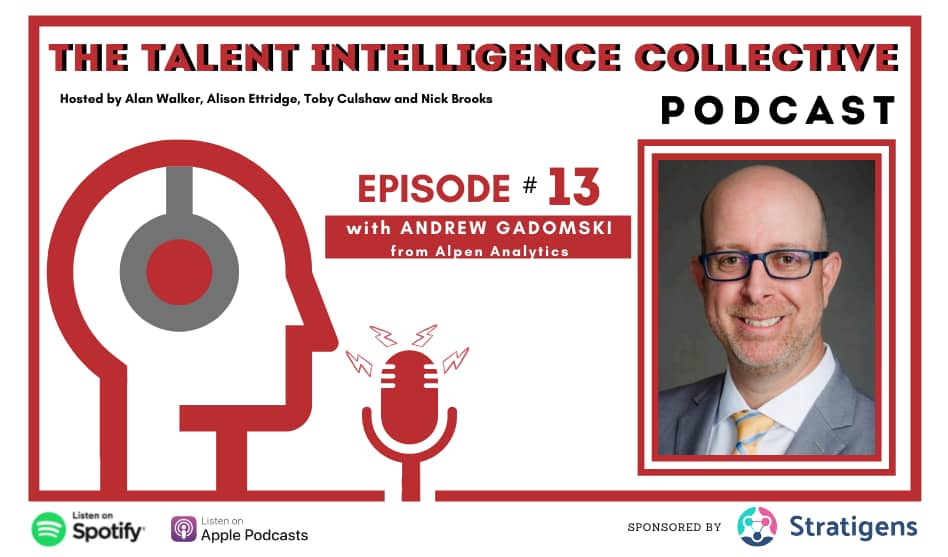Welcome to the 13th episode of the Talent Intelligence Collective Podcast!
Before I jump into this episode – I wanted to let you know about an extra special offer our sponsors Stratigens are offering to all our listeners.
If you go to Stratigens.com, book a demo, and enter the promotional code “TIC2021”, you’ll get a discount and a free proof of concept. How wonderful!
In this episode, apart from being joined by my amazing co-hosts Toby Culshaw and Nick Brooks, we welcomed the incredible Andrew Gadomski from Aspen Analytics.
We started off the episode in our typical fashion, with Toby updating us on the happenings within the world of Talent Intelligence. Specifically with a topic that has caused quite a stir – Google considering cutting pay off those work from home.
For me, it’s quite an interesting one, as I don’t really see it as big of news as it’s been built up to be. Most companies will have some form of calculation based on where their employees are working (regions, cities and countries). There has always been a pay flex.
Toby Culshaw
This is a hot topic, isn’t it? And I think the biggest issue is that people are confused. Employers should start making this part of their employment brand. Full transparency.
Andrew Gadomski
However, when viewing this topic from a different perspective, surely employees should be paid on the outcome of their roles, regardless of where and how it is completed?
I think many companies, and specifically Google have just caused quite a bit of confusion for their staff. So with this transparent tool, employees will be able to select whatever works for them, and they will be compensated in accordance with their choices.
Nick Brooks
Clearly, there are definitely a lot of factors. It’s not just a clean-cut solution. And most of us are still in experiment mode.
Moving on to a completely new topic, we discussed the often seen parallels between Talent Intelligence and Competitive Intelligence, highlighted with a PhD paper by Luis Madureira.
Which, of course, fuelled me to ask Andrew the essential question for our podcast guests – What is his definition of Talent Intelligence?
I was prepared for this question and I believe Talent Intelligence to be a function whose job it is to aggregate information about the workforce, the competition, the diversity, the salaries etc.. and to use that information to determine where, when and how to do things differently.
Andrew Gadomski
It’s definitely murky waters. With many cross overs between competitive, sourcing and talent intelligence. So much so that Toby shared his idea of renaming Talent Intelligence to Labour Market Intelligence.
Having time for just one more worldly update, pivoting our chat to something that we’ve discussed a few times on this podcast within Ep. 5 with Lyndon Llanes and then again on Ep. 9 with Chris Pratt – the mandate by the SEC around human capital disclosure.
The thing is, this is just not a US thing. If you are public and trading in the United States you have to send in this data to the SEC when you do your annual filing. So that’s a lot of companies having to collate this information.
Andrew Gadomski
The sceptic in me is screaming right now. If the SEC doesn’t have strict enough guidelines on exactly what and how this information needs to be produced, could it be produced in such an aggregated manner that it becomes virtually useless?
Nick Brooks
Already way past our halfway point; it was definitely time for us to find out more about our amazing guest, Andrew. And as Alison was away enjoying some much-needed sunshine on holiday, it was up to Nick to ask those hard-hitting questions.
We discussed the challenges of bringing together internal and external data sources and deriving meaningful insights from them. As well as the importance of data hygiene.
In Alison’s absence, I thought I would give it a go at asking a few questions myself. So with roughly only 10mins left of our episode, I was eager to ask about how Andrew believed the perception of data and analytics has changed since he launched Aspen Analytics back in 2006 when gut feel and guesswork reigned supreme.
The questions have definitely changed. People want to understand more. As I think they’ve finally understood that data will help them make better strategic decisions. And that alone changes everything, right?
Andrew Gadomski
So while there is a lot more scrutiny and pointed questions, people do seem to finally be buying into the vision that is Talent Intelligence and how it can help a business strategically.
I may be a bit bias when I say this, but I really do think this was such an interesting episode. Especially when Andrew discussed his definition of Talent Intelligence and how he believes it will change over the coming years.
As always, we would love to hear your feedback! So please leave us a review. Let us know what works, what doesn’t…
And if you can, help us spread the word, your support is very much appreciated.
Till the next one – stay intelligent!
———-
Don’t forget to say hi to our wonderful sponsors → Stratigens from @Talent Intuition.








